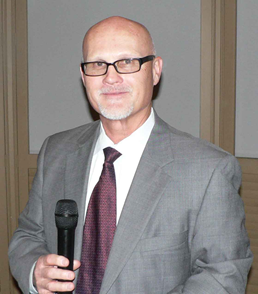Dan Dreiling, Chief of Police (ret), PV Estates

Dan Dreiling was born and raised in Los Angeles. He graduated from the FBI Academy, and joined the Palos Verdes Estates Police Department in 1981. He became Chief, and retired in 2013. Because of political turmoil on the City Council and loss of the City Manager, he was appointed interim City Manager, from which he is now also retired.
He discussed the stresses in law enforcement today related to effects of political partisanship, public policy changes and social trends. Sensational publicized police shootings of black men have led to calls for quick justice, although a thorough investigation by a neighboring law enforcement agency, prosecutors, local politicians (for city liability), and sometimes federal civil rights investigators may take up to 6 months to ensure reliable documentation of the facts for an unambiguous judgment of fault. Bystanders may have conflicting interpretations of what occurred, and delay in announcing conclusions is often interpreted as “cover-up” or delaying to allow the controversy to fade.
He is concerned about the consequences of California legislation releasing prisoners early (ostensibly those without violent tendencies), to relieve prison crowding (in response to a federal court ruling and constrained by chronic budget problems). Also, some crimes previously classified as felonies were reclassified as misdemeanors. Some state prisoners have been reassigned to local jails for at least part of their sentences, increasing jail crowding and inmate stresses. Of 50,000 statewide releases, about 18,000 are in the Los Angeles area. Many cases are settled with reduced charges to minimize costs and court congestion.
He reviewed his experiences stemming from a meeting of law enforcement officers at the Holiday Inn Hotel (now DoubleTree) in Torrance on February 14, 1994. They were mostly unarmed and not in uniform in a room, when a gunman barged in and ordered them to put their hands on top of their heads. Chief Dreiling recalled raising his hands cautiously with a gun at the back of his head. The gunman went to another officer who was not cooperating, and shot him dead. Another officer was also shot, when Chief Dreiling and other officers wrestled the gunman to the floor and held him immobilized while trying to retrieve the gun. Chief Dreiling held his knee on the gunman’s neck to help keep him immobilized until help arrived.
The District Attorney’s investigation of alleged “lethal force” by Chief Dreiling against the gunman on the floor became a stressful 6-month nightmare for him, with investigators who had not been there questioning whether the force he used was excessive in severity or duration to immobilize the gunman before handcuffs were made available. News media coverage about the tactics used was questioning and unfavorable. (The Chief survived the controversy, and is still here. He seems relieved to be retired.)